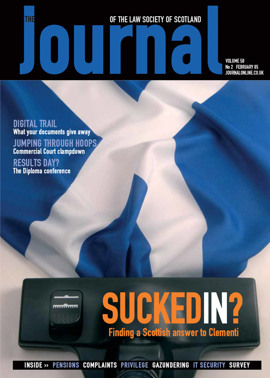Finding the path

In the pre-conference publicity it was made clear that the Society had reached no policy decisions on the future of the Diploma and that the intention of the conference was to commence a fact finding and consultation exercise. Substantial amounts of the day were devoted to interactive workshop sessions and although presentations were made, much of the feedback from the day was based on the outcomes of workshops conducting SWOT analyses of the Diploma and considering potential ways forward.
Time for a fresh look
Conference participants were asked whether the Society should examine further:
- the curriculum/syllabus of the Diploma;
- defining a set of skills outcomes for the Diploma;
- a model based on a “core” and further “electives”;
- retaining the core materials in the current form;
- retaining the core materials, but in an amended format;
- issues of access and flexible learning in the Diploma;
- assessment at the Diploma stage;
- developing a portfolio for use in the Diploma or in the Diploma and traineeship.
To most questions participants responded with a “yes”; in the case of the curriculum/syllabus and defining skills outcomes, with an overwhelming “yes”. The one area where we received a negative answer was in relation to retaining the core materials in the current form. There were many common themes, one of which was a belief amongst participants that one of the Diploma’s key strengths is the involvement of the profession in its delivery. The need for coherence in the components of training for solicitors (through degree, Diploma, traineeship, Professional Competence Course and even, in the views of some, solicitors’ CPD requirements) was emphasised by many.
Following the conference, we consider that we have an indication, from the 70 people interested enough to give up a December Saturday, of the direction they wish to see the Diploma taking in the short to medium term future. While we acknowledge that this is not a mandate to develop in one particular direction, we do consider that there was enough of a consensus on key issues to provide a clear path to follow.
Next year, and beyond
Inevitably, the initial focus will be on revising Diploma materials for the 2005-06 academic year, a project which will be taken forward through the Diploma Co-ordinating Committee. It would, however, be missing an opportunity to concentrate only on short term “fixes”. The Society will be looking at defining a set of outcomes for the entire training process, culminating in a definition of the requirements for a newly qualified solicitor. This definition will map back into the components of the training and will lead to defined outcomes for all stages, including the Diploma.
The position as stated pre-conference remains: the Society has taken no policy stance on the future of the Diploma. The work on the outcomes of the training process will inform debate on the content and structure of the Diploma, and the status of core teaching materials. It is not intended that this debate be engaged in internally. The process will be stronger for our having sought the input of those we consider partners in the process, be they Diploma providers, tutors or the training profession, or, indeed, a wider audience.
We intend to report regularly on progress – at the Society’s AGM, through the pages of this Journal, the Society’s website and at a conference to be held in early June 2005. The consultation document “Lawyers of the Future”, which was issued last year and which remains on the Society’s website under the heading “Foundation Document”, is part of this process. If you have not already done so, I encourage you to consider its content.
As always, the views of all with an interest in the future of the profession are welcome. And we are talking about the future of the profession; education and training is key to what it is to be a profession. My thanks to all who participated so fully in the December conference; your contribution to date has been invaluable. It is often easier to criticise the efforts of others than to offer creative solutions. Through engagement with those who are enthusiastic and committed to training the next generation, we will be able to move forward and I would encourage greater involvement with the Society in this process.
Liz Campbell, Director (Education and Training)
In this issue
- Sell or transfer? (1)
- Promoting competition or competitiveness?
- Promoting competitiveness or competition?
- Not the final word
- Challenge of the FSA
- The pull of the south
- A world of change
- Finding the path
- An elusive model?
- Bank on it
- Trouble at t'mill
- Hidden evidence
- Money claims on behalf of children
- Secure connections
- Tread carefully
- Sell or transfer?
- Cracking the conflict code
- X Factor for success?
- Scottish Solicitors' Discipline Tribunal
- Website reviews
- Book reviews
- Is "gazundering" always bad?
- Defining the guideline






